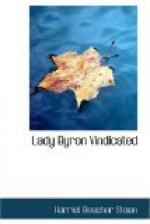Lord Byron states that his wife deserted him. Lady Byron states that he expelled her, and reminds him, in her letter to Augusta Leigh, that the expulsion was a deliberate one, and that he had purposed it from the beginning of their marriage.
Lord Byron always stated that he was ignorant why his wife left him, and was desirous of her return. Lady Byron states that he told her that he would force her to leave him, and to leave him in such a way that the whole blame of the separation should always rest on her, and not on him.
To say nothing of any deeper or darker accusations on either side, here, in the very outworks of the story, the two meet point-blank.
In considering two opposing stories, we always, as a matter of fact, take into account the character of the witnesses.
If a person be literal and exact in his usual modes of speech, reserved, careful, conscientious, and in the habit of observing minutely the minor details of time, place, and circumstances, we give weight to his testimony from these considerations. But if a person be proved to have singular and exceptional principles with regard to truth; if he be universally held by society to be so in the habit of mystification, that large allowances must be made for his statements; if his assertions at one time contradict those made at another; and if his statements, also, sometimes come in collision with those of his best friends, so that, when his language is reported, difficulties follow, and explanations are made necessary,—all this certainly disqualifies him from being considered a trustworthy witness.
All these disqualifications belong in a remarkable degree to Lord Byron, on the oft-repeated testimony of his best friends.
We shall first cite the following testimony, given in an article from ‘Under the Crown,’ which is written by an early friend and ardent admirer of Lord Byron:—
’Byron had one pre-eminent fault,—a fault which must be considered as deeply criminal by everyone who does not, as I do, believe it to have resulted from monomania. He had a morbid love of a bad reputation. There was hardly an offence of which he would not, with perfect indifference, accuse himself. An old schoolfellow who met him on the Continent told me that he would continually write paragraphs against himself in the foreign journals, and delight in their republication by the English newspapers as in the success of a practical joke. Whenever anybody has related anything discreditable of Byron, assuring me that it must be true, for he heard it from himself, I always felt that he could not have spoken upon worse authority; and that, in all probability, the tale was a pure invention. If I could remember, and were willing to repeat, the various misdoings which I have from time to time heard him attribute to himself, I could fill a volume. But I never believed them. I very soon became aware of this strange




